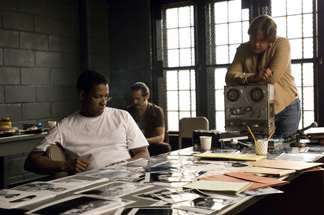Movie Review: American Gangster
By Tom Houseman
November 19, 2007
Rarely does one find film music as captivating as Marc Streitenfeld's score for Ridley Scott's film American Gangster. Streitenfeld's music — only the second movie score he has composed — pervades the film in an incredibly powerful way, and does a fantastic job of adding to the tone and atmosphere of the film. In fact, Ridley Scott creates excellent tone and atmosphere in American Gangster, which is set mainly in 1970s Harlem. That's right: over two and a half hours of outstanding tone and atmosphere, and absolutely nothing else.
There really is extraordinarily little that is good to say about American Gangster beyond Streitenfeld's music. The two main characters, drug lord Frank Lucas (Denzel Washington) and cop Richie Roberts (Russell Crowe) are painfully one-dimensional and very poorly developed. It is difficult to create an interesting film with one-dimensional main characters, but the way that writer Steven Zaillian structures his screenplay makes it impossible. The focus of the film is Lucas' rise to power as he becomes the most powerful drug kingpin in New York, and Richie's attempts to take down Lucas. Much of the film is spent contrasting Lucas' charisma and charm with Richie's boorishness, and although this perspective could have been summed up in a few minutes, Zaillian and Scott felt the need to hammer it in over the course of 156 minutes.
Even with two excellent actors in the lead roles, Zaillian's script is so flawed that the movie is never able to recover. Lucas is portrayed as a borderline-psycopath who is obsessed with power, which he hides behind his façade of a family man. There is absolutely no way for anyone to sympathize or relate to Lucas, which is a shame because he is a fascinating character and, if he were explored as an actual person, American Gangster would have made for a great biopic. Instead, Zaillian contrasts Lucas with Richie, the only non-crooked cop in New York City. Richie is an incredibly dull character, and the subplot of his custody battle with his ex-wife over his son is irrelevant to the events of the film. Had Zaillian chosen to remove much of Richie from the film, and instead further developed Lucas as a complex character, American Gangster would have been a much better film, and hopefully a much shorter one.
Ridley Scott does very little as a director to salvage Zaillian's script and keep American Gangster from crashing and burning. Scott, as mentioned above, recreates the ambiance of 1970s New York thoroughly, and takes pains to place the events of the film in the historical context of the Vietnam War, which was taking place at the same time as Lucas' rise to power. Why, might you ask, is the Vietnam War so important to this film, other than as a plot point? Frankly, it isn't. Scott's continual references the Vietnam War do not speak to any underlying theme in American Gangster, and really only add to the already mammoth running time of his film. Scott must have a deal where he gets paid per minute of film, as American Gangster's painful 156 minutes is just the latest in a series of epics that are 155, 144, and 145 minutes long. Clearly nobody has told Scott that brevity is the soul of wit, as American Gangster is severely lacking in brevity, wit, and soul.
To further break down Scott's directional faults would be to ruin the ending of the film for anyone who wants to waste their night watching American Gangster. Suffice it to say that the end of the film is almost captivating, but Scott drains any tension by playing out these scenes far too long and making them painfully overdramatic. It is a thoroughly disappointing ending that would have marred a great film, but instead merely serves as another example of what is wrong with American Gangster.
Washington does what he can with the poorly developed role of Frank Lucas. Certainly he was perfectly cast to play a man who can be both charismatic and cruel, and he does a good job with it, but considering the far more interesting and complex roles that Washington has played in Malcolm X, The Hurricane, and Training Day, it's easy to feel like this is a performance Washington could give in his sleep. By comparison, Crowe might in fact have been asleep during filming, as his character is so boring that it must have been difficult for him to stay awake. Of course, with no other character even remotely developed — the other cop is pure evil and Lucas' wife is very attractive; thus ends the summary of the supporting characters — and the film dragging on and on without making any point beyond the initial contrast of Lucas and Richie, the audience might join Crowe in his nap. It would certainly be a better use of time than sitting through American Gangster.




